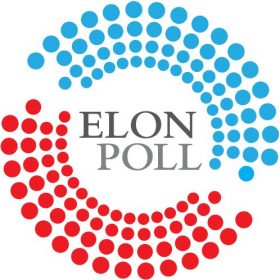The Elon University Poll, for the first time in its history, used an online survey to ask registered voters about their impressions of North Carolina's U.S. Senate candidates this fall while measuring the way name ordering on ballots might affect support for major party nominees.
 If you’re a major party candidate running for U.S. Senate in North Carolina, you don’t want to be seen with President Barack Obama or Republican Gov. Pat McCrory, and you don’t want to be listed first on the ballot.
If you’re a major party candidate running for U.S. Senate in North Carolina, you don’t want to be seen with President Barack Obama or Republican Gov. Pat McCrory, and you don’t want to be listed first on the ballot.
It also appears that a vote for the Libertarian Party candidate in the race could make the difference in a close contest – a difference that would favor the Republican Party.
These are some of the implications of an Elon University Poll online survey of 763 registered voters in North Carolina. The survey, the first of its kind for the Elon University Poll, employs a series of randomized experiments to measure the perceptions and motivations of North Carolina voters as they consider their choices in a U.S. Senate race featuring incumbent Democrat Kay Hagan and her Republican challenger, Thom Tillis, speaker of the North Carolina House of Representatives.
The Sept. 28-Oct. 5, 2014, survey from an online opt-in panel helps explain the way voter behavior is affected by a variety of factors.
State law determines the ballot order in general elections and because Pat McCrory won the race for governor in 2012, the Republican candidate will appear first on the ballot in the 2014 midterm election. When presented with a visual representation of the ballot, Hagan does better against Tillis when Tillis is listed first on the ballot. Tillis does better when Hagan is listed first. Both candidates received a 6-point bump when their names were listed second.
Results suggest that Tillis may lose some votes because his party won the gubernatorial election in 2012. The poll findings are in line with previous election research.
“The online survey uses random assignment, various images of the candidates, and different ballot ordering to answer some interesting questions about the 2014 midterm election that a traditional telephone poll could not,” said Assistant Professor Kenneth Fernandez, director of the Elon University Poll.
While public opinion polls frequently exaggerate the amount of votes a third party candidates will receive in an election, by just being on the ballot, Libertarian Party candidate Sean Haugh is guaranteed to get a share of the vote.
The survey randomly assigned respondents to the full ballot that voters will see in the voting booth and a shortened ballot without the Libertarian Party candidate. The results show that in a close race, Haugh may siphon twice as many votes from Hagan than he would Tillis.
“A review of the political science literature and prior polls clearly shows that most surveys greatly exaggerate the amount of support a third-party candidate is likely to receive in an election,” Fernandez said. “Having said this, the results from this study suggest that if the race is very close, Tillis benefits from Sean Haugh being on the ballot.”
As a measurement component of the poll, respondents were randomly shown different digital postcards with candidate names, photos and policy messages. Hagan’s favorability was higher than Tillis’ in all eight policy areas: education, women’s health, the economy, national defense, immigration, health care, voter ID laws and “families.”
Her strongest levels of approval were found in messages about education and women’s health. However, her advantage over Tillis shrank considerably when respondents viewed postcards about immigration, national defense, and what makes a family.
“We used a series of randomized policy primes to measure candidate strengths on the issues,” said Assistant Professor Jason Husser, and assistant director of the Elon University Poll. “This method is arguably more accurate than asking respondents directly about who they favor. When we tapped underlying perceptions of candidates on the issues, we found Hagan doing better overall on most issues, but Tillis has opportunities on immigration, foreign policy, and voter ID.”
Women tended to view Hagan more favorably than Tillis on most issues, except immigration. Men generally rated both candidates similarly except when prompted to think about education and women’s health. In those cases, men generally rated Hagan more favorable than Tillis.
“Results suggest voters are polarized when it comes to their underlying perceptions of candidates on the issues” Husser added. “On every policy tested, Republicans prefer Tillis and Democrats favor Hagan.”


